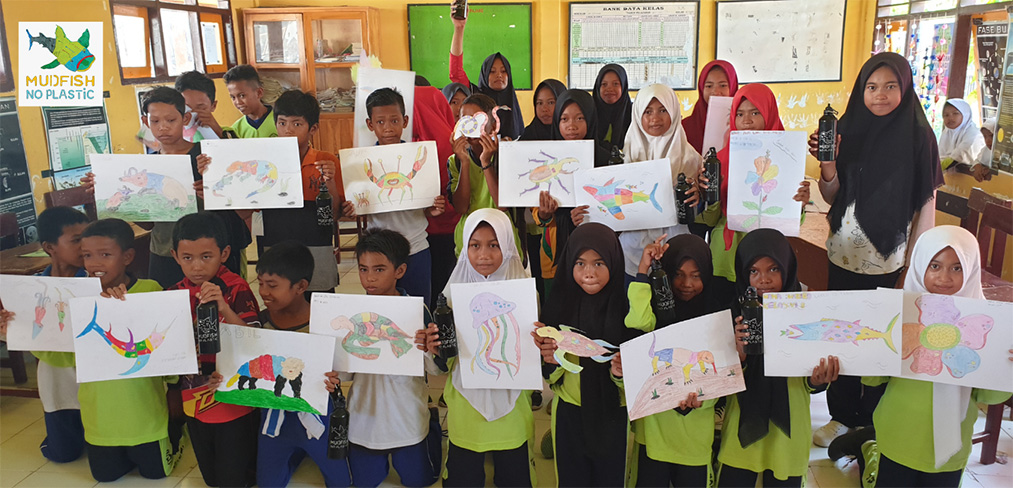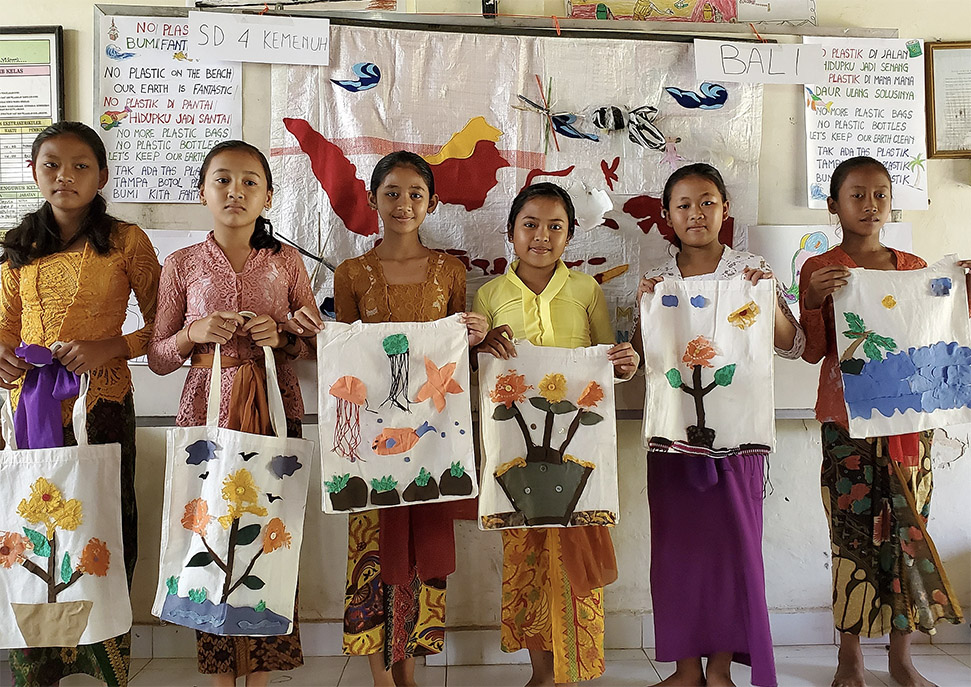Focusing On Youth Education in Indonesia
“Without education we will be stuck in a never-ending cleanup,” says Mora Siregar, co-founder and co-director of MUDFISH NO PLASTIC, another recent member of the Plastic Oceans’ BlueCommunities global family.
In saying this, Mora strikes at the core of the plastic waste issue, that unless proactive investment is made into the future generations, we will be forced to continue in the same unending hamster wheel of mitigation.
Operating since 2017, Mudfish is a traveling team of eco-educators in Indonesia which have taken on the critical role of raising awareness and action on the dangers of single-use plastic, using interactive workshops across the country.
“Mudfish No Plastic epitomizes the kind of organization that we seek collaboration with, especially within our BlueCommunities initiative,” said Tod Hardin, COO of Plastic Oceans International. “Youth education, with a true community focus, is a highly effective game changer in the fight against plastic pollution. Mora and her team are doing it right and we could not be happier in our efforts to support their work.”

The Mudfish No Plastic brand of eco education through art.
Based in Bali – the best known and most heavily visited island of Indonesia – Mudfish has given 46 workshops on the issues of plastic pollution to more than 800 youth participants in the first half of 2021 alone.
Two additional islands Mudfish has expanded to, Java and Lombok, share the same fortune as Bali in being brilliantly beautiful, yet severely polluted. Indonesia has attained enormous amounts of waste due not only to the footprint of the more than six million annual visitors, but also to the general lack of awareness surrounding the over consumption of single-use plastic among locals.
As a result, Mudfish responded by making education for the children of Indonesia its primary focus. Their original curriculum enables participants to better understand the dangers of single-use plastic. They cultivate interactions which empower local children with the means to act, and speak, in smarter, healthier ways. Simultaneously, Mudfish No Plastic fosters opportunities for the next generation to become role models in, and for, their community.
Making the most of the ongoing pandemic, Mudfish No Plastic has limited its immediate broad outreach in the recent past and has instead focused on running training programs for the older youth closer to home. Siregar reveals that “by 2022 we aim to have five additional two-person educator teams, qualified to run workshops.” In doing so, the older youth will be prepared to spread the message and instruction of Mudfish even further.
The Mudfish team prioritizes reaching small communities, those that suffer from economic disparities and those afflicted by natural disasters. During their visits to the outlying villages, reusable water bottles are gifted to the children, as well as tote bags to encourage the refusal of plastic bags. The reusable bottles showcase artwork inspired by children, while the tote bags can be customized by the participants as part of the workshop activities.

Students show off their custom designed tote bags created through the Mudfish No Plastic programs.
Encouraging local citizens to divest themselves of single-use plastic bottles is crucial given that access to drinking water is often problematic.
“Buying reusable water bottles is a luxury for many of us, especially those who are living in remote villages,” says Siregar. “Our mission is to give children across Indonesia this gift from us, so that they stop drinking water from a plastic bottle. Families will save money, the environment is saved from plastic, and the children are healthier.
“We have learned over time that although running workshops for children has had a positive impact on their own behavior, workshops themselves did not make a significant improvement in the attitudes and practices of their community at large,” Siregar explains. “To address this we began to more closely integrate parents and community leaders into the process.”
To earn trust from locals, Mudfish began speaking to village leaders and school headmasters to share their project and their goals.
“We provide the community with knowledge about the importance of trash separation at the source.” says Siregar. “We explain how we need their cooperation and assistance to get the most from the project in reducing plastic consumption, waste collection and recycling.”
Then, with the help of the community, the team sets up trash bins in local schools, beach communities, even rice fields, providing a place where anyone can dispose of plastic.
“Once they fully understand, we agree upon a centralized trash collection location and connect them with a recycling organization that schedules regular plastic waste pickups,” Siregar explains.
What is so major about this non-profit group is that they understand that change in behavior takes time and it is not always easy. Altering habits, and more importantly, mindsets, takes patience and encouragement. Locals must also learn about the available alternatives so that they can make better decisions in their own lives. Siregar reaffirms this by adding that, “the only permanent solution for the pollution problem is for every individual to have better options to choose from.”
Mudfish No Plastic has gone far in providing education, free reusable resources, and community trash cans. Much of this would not be possible without the help of generous donations. Still, Mudfish is in need of more collaboration and exposure to get their information out to a wider audience.
“We need invitations and opportunities to tell our story to a wider audience and to reach the attention of leaders in business and government.” Their hope is to continue providing education and resources to all of the youth in Indonesia in the ongoing fight against plastic.
Kalee Lamp Sparr is a freelance writer and educationalist from Iowa. She is also part of the Environmental Journalism team at Ninth Wave Global.

Trackback: พูลวิลล่า
Trackback: Morpheus8
Trackback: 바카라 꽁머니
Trackback: ประวัติ ความเป็นมา ของค่าย playtech
Trackback: xxx โอลี่แฟน
Trackback: วิธีเล่นไพ่ดัมมี่ แบบดั้งเดิมและแบบออนไลน์
Trackback: filler
Trackback: Nonameauto
Trackback: เว็บปั้มไลค์
Trackback: empresa serviços informática lisboa
Trackback: เติมเกม
Trackback: เช่ารถตู้พร้อมคนขับ
Trackback: Daha fazlasトアnトア テカト殲enin